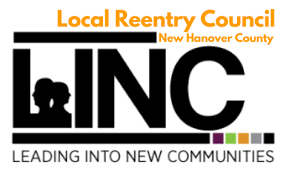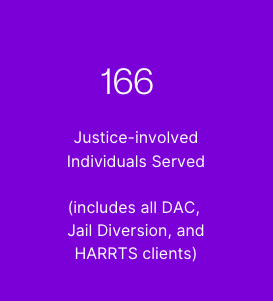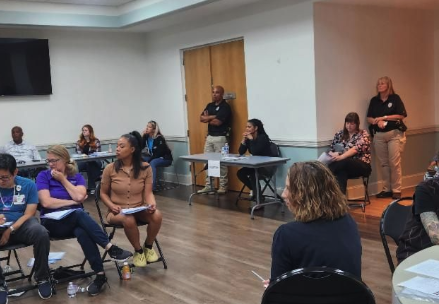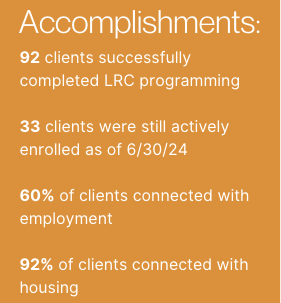Contact Information | NHC Local Reentry Council (LRC)

Linda Thomas, Lead Case Manager/Local Reentry Coordinator
(910) 889-1140 (910) 332-1138 | lthomas@lincnc.org
Iris Bryant, Case Manager, Certified Peer Support Specialist
(910) 889-1140 Main (910) 421.2827 | ibryant@lincnc.org
Local Reentry Council – New Hanover County flyer (downloadable)
LRC Orientation flyer (downloadable)
Pender Local Reentry Council/Duplin Local Reentry Council
Catherine Jacobs
Pender and Duplin Counties Case Manager
stucker@lincnc.org
910.226.2303
Brunswick Local Reentry Council
Christopher Bryant
Brunswick County Case Manager
cbryant@lincnc.org
910.380.9291
What We Do
The Local Reentry Council – New Hanover County at LINC, Inc.(LRC) is an integrated network uniting various entities to facilitate the successful reintegration of current and former justice-involved individuals at the local level. By leveraging existing program services, LRC endeavors to reduce recidivism rates by providing essential support such as housing, transportation, and educational assistance.
LRC is part of a network of agencies across North Carolina that provides support for individuals with legal histories, and for their families. There are Local Reentry Councils (LRCs) across the state. New LRCs are being established in Pender and Brunswick counties.
The primary role of the Local Reentry Council coordinator is “point of contact” in the process of returning from incarceration. This coordinator is the lead case manager in providing comprehensive case management services to returning citizens, coordinating the community’s input in the implementation of the North Carolina Reentry Council Comprehensive Plan, providing outreach to and education on the importance of reentry to the public, and recruiting and collaborating with service providers and criminal justice professionals.
Clients should speak with their counselor for up-to-date resources and referrals for:
- Individualized case management
- Temporary shelter and housing (including M.E. Roberts campus)
- Personal safety
- Financial services
- Legal service referrals
- Family re-unification and support
- Immigration
- Medical and healthcare
- Mental health support
- Substance and addiction counseling
- Employment assistance
- Food banks, pantries and meals
- Education and vocational training
- Transportation
Who is Eligible for Local Reentry Council Assistance
All individuals who are returning from incarceration or are justice-involved are welcome to apply for services from LRC. Those who are currently in prison are given priority.
Clients are referred by other LINC programs, parole officers, justice officials, family or other community groups and nonprofits. Justice-involved individuals also connect with the LRC on their own.
The LRC serves men and women, all ages, and does not discriminate on the basis or race, color, sex, or religion.
How to Apply
The LRC’s process of connecting clients with services begins with a required orientation session.
WHEN: Orientation is held the 2nd and 4th Friday of every month at 1:00 pm
WHERE: LRC, 20 North 4th Street, Suite 430 (Harrelson Center), Wilmington NC
After orientation, clients are assigned a case worker for an individualized plan to address needs and identify programs and services that will help.
All LRC clients are required to take 8 classes with LINC’s Cognitive Behavioral Intervention (CBI) program. These classes can be started before contacting the LRC and before attending an Orientation session.
See the LRC Orientation flyer.
#SecondChances
Mission: To reduce recidivism and victimization, increase public and community safety, create a network of individuals and organizations assisting returning citizens, maximize the use of existing resources and services, and develop innovative responses to address gaps in resources and service.
At a Glance | Fiscal Year ending June 30 2024




In 2010, the NC General Assembly created the Joint Select Committee on Ex-Offender Reintegration into Society. This legislative committee made several recommendations, including the development of local reentry councils which eventually became the basis for SB 141 (SL 2012-168, Section 5(b) and (c)).
This bill reads: “SECTION 5.(c) During the 2012-2013 fiscal year, the Research and Planning Section of the Department of Public Safety shall work with local communities to form up to 10, but not less than three, local reentry councils to develop comprehensive local reentry plans, to document and maximize the use of existing services, and to supervise and coordinate innovative responses to the reintegration of ex-offenders at the local level. The Section shall also form a State-level advisory group with broad representation of involved State agency leadership, service providers, and program recipients.”
In January 2024, Governor Roy Cooper signed an Executive Order that will cause the expansion of reentry services, coordination between government agencies, and establish additional Local Reentry Councils across the state.
